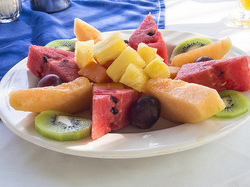
We've shared some tips for saving money on organic food in previous posts, so I won't cover those again here today, but be sure to check those out as well. (Of course, the best way of all is to grow your own food! But we'll save that for another day.)
One great way to make sure you're eating healthy is to choose whole, unprocessed foods. Processed foods command a premium, as we have previously mentioned. You're paying a lot for someone else to process and package your food for you - and in the process, you're also losing nutritional value. Whole, natural, unprocessed foods are cheaper by the pound than any seemingly "cheap" processed items you can buy - and better for you, to boot. Want to save money on food - and eat healthier? Buy the fresh, unprocessed ingredients, and make it yourself!
But another thing to be aware of is that some foods are more important to buy organic than others. You can strategically save money and still buy and eat healthy foods, if you know which non-organically raised foods to avoid, and which ones are okay to eat. That way, you can put the "organic" portion of your food dollars towards foods that really shouldn't be eaten any other way.
While organic meats (preferably grass-fed) may cost a bit more, it's one of those things that's definitely worth the money to me. (And once you've tried real, grass-fed, sustainably raised meat and dairy, you'll never go back! Seriously, it's that good.)
That said, I'm certainly all about saving money if it makes sense, especially if there's really not much additional benefit to eating the organic vs. the non-organic version of a particular food.
Here's what I mean by that. When it comes to fruits and vegetables, one of the main benefits of buying organic is to avoid consuming the pesticides and chemicals that are typically used on the non-organic versions.
However, certain foods have a thick skin barrier between the outside world and the fruit inside, which protects it from most of the pesticides and other chemicals it may come into contact with. Also these types of fruits are the kinds where you usually don't eat the skin.
Here are 4 foods with thick skins that you remove before eating, which are generally okay to buy in the non-organic versions:
- Bananas
- Avocados
- Grapefruits (and other citrus)
- Melons
On the other hand, many fruits and veggies with thin or consumable skins - think apples, tomatoes, cucumbers, pears, cherries, etc., are often more contaminated with pesticides and other chemical residues.
Another thing to keep an eye out for is whether a lot of pesticides or other chemicals are commonly used on a food due to its particular characteristics. For example, there are some foods that most pests naturally avoid, so they typically don't have a lot of pesticides used on them.
Here are 4 more foods that aren't typically too bothered by pests (or contaminated with pesticides):
- Onions
- Garlic
- Asparagus
- Pineapples
On the other hand, some of the worst chemicals to ingest are fungicides, and these are used heavily on foods that are prone to mold, such as strawberries and raspberries. Always buy these organic.
You can also check out the EWG's "Dirty Dozen" for the 12 most contaminated foods that you will always want to buy organic. However, if you don't want to try to remember the list, or carry it around with you, you can just remember these 2 simple rules.
Rule #1: If a fruit has a thick skin that you discard and don't eat, you are probably okay saving some cash and going with the non-organic version. (Note: If you're planning to eat the peel - such as the zest of an orange or lemon, go ahead and buy an organic one for that particular use.)
Rule #2: If a fruit or vegetable has a thin or edible skin, or has characteristics that make it particularly prone to pests or fungus, always buy the organic version.
By following these two easy rules, you'll end up spending money on organic foods where they are most beneficial, and saving money in areas where there's not a huge health benefit to be had by choosing the organic version.
Of course, if you're rolling in dough and passionate about the organic cause, it's great to buy everything organic if you can! But if not, follow these tips, check out our previous blog posts for saving money on organic foods, and grow some of your own (organically of course)! :-)
To your health,
Rose.



 RSS Feed
RSS Feed